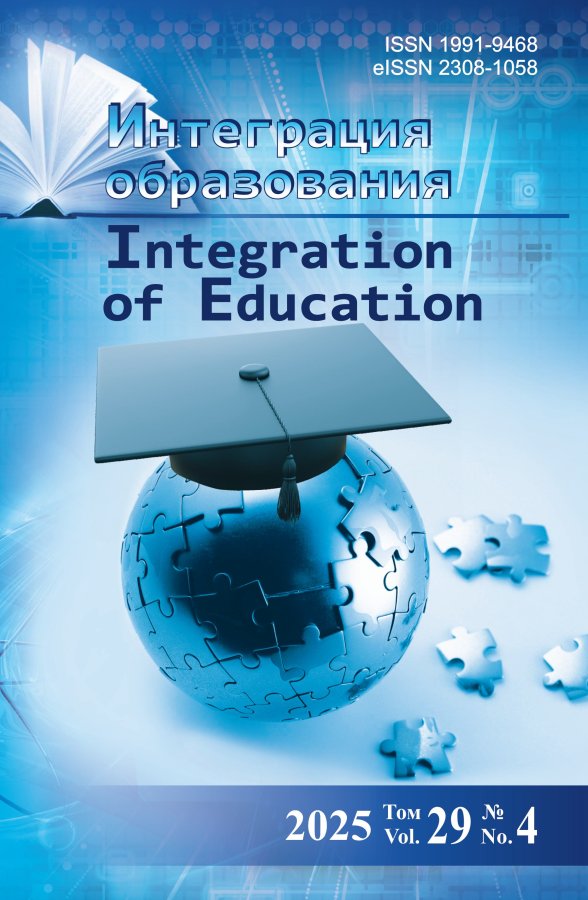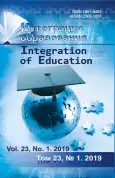Применение инструментов электронного обучения для международной академической мобильности неанглоговорящих студентов-математиков
- Авторы: Снегуренко А.П.1, Сосновский С.А.2, Новикова С.В.1, Яхина Р.Р.1, Валитова Н.Л.1, Кремлева Э.Ш.1
-
Учреждения:
- ФГБОУ ВО «Казанский национальный исследовательский технический университет им. А. Н. Туполева-КАИ»
- Утрехтский университет
- Выпуск: Том 23, № 1 (2019)
- Страницы: 8-21
- Раздел: Международный опыт интеграции образования
- Статья получена: 21.05.2025
- Статья одобрена: 21.05.2025
- Статья опубликована: 15.03.2019
- URL: https://journal-vniispk.ru/1991-9468/article/view/292897
- DOI: https://doi.org/10.15507/1991-9468.094.023.201901.008-022
- ID: 292897
Цитировать
Полный текст
Аннотация
Введение. В статье предлагается подход к организации обучения с использованием специальных электронных обучающих инструментов для более глубокого понимания математики и адаптации обучающихся к математическому языку, используемому в профессиональной среде в принимающей организации (в зарубежной стране). В связи с этим становится актуальной проблема мультиязычной поддержки изучаемых студентами курсов в принимающей стране для более эффективного погружения обучающихся в языковую академическую среду. Цель статьи – описание разработки методологии мультиязычного сопровождения математических курсов в принимающей стране для повышения эффективности академической мобильности студентов с использованием электронных средств обучения.
Материалы и методы. В основу проведенных исследований легли методы системного анализа, а также описательные и аналитические методы, преимущественно экспериментальные. Для определения преимуществ предложенного подхода были использованы методы эмпирических исследований (наблюдение и сопоставление). С целью подтверждения эффективности использовались классические методы измерений.
Результаты исследования. Авторы проанализировали существующие электронные обучающие системы и определили электронную образовательную среду Math-Bridge как позволяющую создавать математические курсы параллельно на нескольких языках. В качестве примера разработан учебный курс «Методы оптимизации» на трех языках для обучения русскоязычных студентов магистратуры. Сравнительный анализ целевой и контрольной групп студентов показал, что в целевой группе 100 % студентов достигли превосходного уровня освоения компетенций, в то время как в контрольной группе такого же уровня компетенций достигли лишь 75 % студентов. Степень мотивации к изучению математики в контрольной группе практически не изменилась, увеличение составило всего 0,86 %. Однако в целевой группе уровень интереса к изучению математики возрос с 0,9 до 8,9 % (в среднем рост составил 2,21 %).
Обсуждение и заключение. Результат проведенного педагогического эксперимента показал эффективность предлагаемого подхода при обучении студентов на английском языке в рамках международной академической мобильности. Полученные результаты будут полезны для сотрудников вузов, участвующих в программах международной академической мобильности студентов.
Об авторах
Александр Павлович Снегуренко
ФГБОУ ВО «Казанский национальный исследовательский технический университет им. А. Н. Туполева-КАИ»
Email: APSnegurenko@kai.ru
ORCID iD: 0000-0002-5515-3544
ResearcherId: I-1028-2017
начальник Управления международной деятельности, кандидат технических наук
Россия, 420111, Казань, ул. Карла Маркса, д. 10Сергей Александрович Сосновский
Утрехтский университет
Email: s.a.sosnovsky@uu.nl
ORCID iD: 0000-0001-8023-1770
Scopus Author ID: 8935519700
доцент кафедры информационных и вычислительных наук, группа компьютерных технологий обучения и преподавания, доктор философии
Нидерланды, 3584 СС, Утрехт, ул. Принстонпляйн, д. 5Светлана Владимировна Новикова
ФГБОУ ВО «Казанский национальный исследовательский технический университет им. А. Н. Туполева-КАИ»
Автор, ответственный за переписку.
Email: sweta72@bk.ru
ORCID iD: 0000-0001-8207-1010
Scopus Author ID: 55355243900
ResearcherId: B-6505-2017
профессор кафедры прикладной математики и информатики, доктор технических наук
Россия, 420111, Казань, ул. Карла Маркса, д. 10Рузиля Раифовна Яхина
ФГБОУ ВО «Казанский национальный исследовательский технический университет им. А. Н. Туполева-КАИ»
Email: shroza1981@yandex.ru
ORCID iD: 0000-0002-7371-064X
Scopus Author ID: 57194621008
ResearcherId: C-7689-2018
заведующий кафедрой иностранных языков, кандидат филологических наук
Россия, 420111, Казань, ул. Карла Маркса, д. 10Наталья Львовна Валитова
ФГБОУ ВО «Казанский национальный исследовательский технический университет им. А. Н. Туполева-КАИ»
Email: valinata@rambler.ru
ORCID iD: 0000-0002-8408-1885
Scopus Author ID: 23013218200
доцент кафедры прикладной математики и информатики, кандидат технических наук
Россия, 420111, Казань, ул. Карла Маркса, д. 10Эльмира Шамильевна Кремлева
ФГБОУ ВО «Казанский национальный исследовательский технический университет им. А. Н. Туполева-КАИ»
Email: e-smile29.04@mail.ru
ORCID iD: 0000-0003-0858-0575
Scopus Author ID: 57194618280
старший преподаватель кафедры прикладной математики и информатики
Россия, 420111, Казань, ул. Карла Маркса, д. 10Список литературы
- Obst D., Kuder M. Joint and Double Degree Programmes: An Emerging Model for Transatlantic Exchange // Institute of International Education. 2009. 169 p. URL: http://www.iiebooks.org/joanddodepre.html (дата обращения: 29.12.2018).
- Fernández Agüero M. Erasmus Mobility and the Education of Interculturally Competent European Teachers // Journal of Supranational Policies of Education, Extraordinario. 2017. Pp. 142–158. doi: 10.15366/jospoe2017.m1
- Abankina I. V., Scherbakova I. Russian Higher Education Reforms and the Bologna Process // Journal of the European Higher Education Area. 2013. No. 3. Pp. 3–25. URL: https://publications.hse.ru/en/articles/?search=0f55975b7a321df6620f09c8936fde63 (дата обращения: 29.12.2018).
- Diamond J. The Benefits of Multilingualism // Science. 2010. Vol. 330, Issue 6002. Pp. 332–333. doi: 10.1126/science.1195067
- Math-Bridge: Bridging the Gaps in European Remedial Mathematics with Technology-Enhanced Learning / S. Sosnovsky [et al.] // Mit Werkzeugen Mathematik und Stochastik lernen – Using Tools for Learning Mathematics and Statistics. Berlin/Heidelberg, Germany : Springer, 2014. Pp. 437–451. URL: http://www.springer.com/us/book/9783658031039 (дата обращения: 29.12.2018).
- Mercat Ch., Lealdino P., El-Demerdash M. Creativity and Technology in Mathematics: From Storytelling to Algorithmic with Op’Art // Acta Didactica Napocensia. 2016. Vol. 10, Issue 1. Pp. 63–70. URL: http://math.univ-lyon1.fr/irem/IMG/pdf/CADGME-2016-Mercat-Lealdino-El-Demerdash.pdf (дата обращения: 29.12.2018).
- Analysing and Improving Students’ Mathematics Skills Using ICT-Tools / S. Pohjolainen [et al.] // Eurasia Journal of Mathematics, Science and Technology Education. 2018. Vol. 14, Issue 4. Pp. 1221–1227. doi: 10.29333/ejmste/81869
- Сосновский С. А., Гиренко А. Ф., Галеев И. Х. Информатизация математический компоненты инженерного, технического и естественно-научного обучения в рамках проекта MetaMath // Образовательные технологии и общество. 2014. Т. 17, № 4. С. 446–457. URL: https://elibrary.ru/item.asp?id=22673865 (дата обращения: 29.12.2018).
- Modern Mathematics Education for Engineering Curricula in Europe / S. Pohjolainen [et al.]. Birkhauser : Springer, 2018. doi: 10.1007/978-3-319-71416-5
- Augusti G. Engineers in Europe and the Role of SEFI // European Journal of Engineering Education. 1988. Vol. 13, Issue 1. Pp. 5–9. doi: 10.1080/03043798808939390
- Особенности проектирования компьютерных программ-тьютеров для обучения численным методам математики будущих инженеров / С. В. Новикова [и др.] // Интеграция образования. 2017. Т. 21, № 2. С. 322–343. doi: 10.15507/1991-9468.087.021.201702.322-34
- Сыромясов А. О. Компьютерные технологии в преподавании математики студентам направления «Программная инженерия» // Образовательные технологии и общество. 2014. Т. 17, № 4. C. 518–525. URL: https://elibrary.ru/item.asp?id=22673872 (дата обращения: 29.12.2018).
- Применение и преимущества компьютерных программ-тьютеров в рамках компетентностного подхода для обучения численным методам математики / Э. Ш. Кремлева [и др.] // Образовательные технологии и общество. 2018. Т. 21, № 1. C. 344–362. URL: https://www.jets.net/ETS/russian/depository/v21_i1/pdf/9.pdf (дата обращения: 29.12.2018).
- Kostin V. A., Valitova N. L. Sensitivity Algorithm as a Solution of an Inverse Strength Problem Applied to Thin-Walled Structures // Russian Aeronautics. 2018. Vol. 61, No. 1. Pp. 128–133. doi: 10.3103/S1068799818010208
- Novikova S. V. Application of an Adaptive Correction Algorithm to Control a Gas Turbine Engine Under Conditions of Noises // Russian Aeronautics. 2006. Vol. 49, Issue 4. Pp. 55–62. URL: https://www.scopus.com/record/display.uri?eid=2-s2.0-34248660260&origin=inward&txGid=9951BA49F5A8450C561EAF0CC82EA2D2.wsnAw8kcdt7IPYLO0V48gA%3a19 (дата обращения: 29.12.2018).
- Rodnishev N. E., Novikova S. V., Denisov K. G. Developing Methods and Computer Technologies for Learning, Identification and Optimization of Nonlinear Stochastic Systems // IFAC Proceedings Volumes. 2012. Vol. 45, Issue 11. Pp. 51–56. doi: 10.3182/20120619-3-RU-2024.00044
- Kostin V. A., Valitova N. L. Coefficients of Equilibrium Equations in Solving a Problem of Reconstructing Deformation Curves for Slightly Conical Thin-Walled Structures // Russian Aeronautics. 2007. Vol. 50, Issue 3. Pp. 243–247. doi: 10.3103/S1068799807030026
- Медведева С. Н. Проектирование дистанционного обучающего курса в среде Lotus Learning Space // Образовательные технологии и общество. 2005. Т. 8, № 1. С. 148–164. URL: https://elibrary.ru/item.asp?id=9164966 (дата обращения: 29.12.2018).
- Blackboard as an Online Learning Environment: What Do Teacher Education Students and Staff Think? / A. Heirdsfield [et al.] // Australian Journal of Teacher Education. 2011. Vol. 36, Issue 7. Pp. 1–16. doi: 10.14221/ajte.2011v36n7.4
- Новикова С. В. Проблемы интеграции практико-лабораторных модулей в дистанционный обучающий комплекс среды Learning Space // Образовательные технологии и общество. 2014. Т. 17, № 4. С. 543–553. URL: https://elibrary.ru/item.asp?id=22673875 (дата обращения: 29.12.2018).
- Student Perception of Moodle LMS: A Satisfaction and Significance Analysis / A. Horvat [et al.] // Interactive Learning Environments. 2015. Vol. 23, Issue 4. Pp. 515–527. doi: 10.1080/10494820.2013.788033
- Costa C., Alvelos H., Teixeira L. The Use of Moodle E-Learning Platform: A Study in a Portuguese University // Procedia Technology. 2012. Vol. 5. С. 334–343. doi: 10.1016/j.protcy.2012.09.037
- Lepellere M. A., Cristea I., Gubiani D. The E-learning System for Teaching Bridging Mathematics Course to Applied Degree Studies // Models and Theories in Social Systems. Springer, Cham, 2019. Vol. 179. Pp. 295–309. doi: 10.1007/978-3-030-00084-4_16
- Новикова С. В., Снегуренко А. П. К вопросу создания мультиязычных электронных обучающих курсов // Образовательные технологии и общество. 2016. Т. 19, № 4. С. 429–439. URL: https://elibrary.ru/item.asp?id=27163067 (дата обращения: 29.12.2018).
- Kuzenkov O. A., Zakharova I. V. Mathematical programmes modernization based on Russian and international standards // Современные информационные технологии и ИТ-образование. 2018. Т. 14, № 1. С. 233–244. doi: 10.25559/SITITO.14.201801.233-244
- Новикова С. В., Новикова К. Н. Инструменты оценки эффективности обучения по стандартам SEFI в e-learning системе Math-Bridge // Образовательные технологии и общество. 2016. Т. 19, № 4. С. 496–508. URL: https://elibrary.ru/item.asp?id=27163072 (дата обращения: 29.12.2018).
- Медведева С. Н. Разработка динамических учебных объектов в интеллектуальной системе онлайн обучения математике Math-Bridge // Образовательные технологии и общество. 2016. Т. 19, № 3. С. 522–543. URL: https://elibrary.ru/item.asp?id=26441573 (дата обращения: 29.12.2018).
- Савкина А. В., Нуштаева А. В., Борискина И. П. Информатизация курса «Алгебра и геометрия» с помощью интеллектуальной обучающей системы Math-Bridge // Образовательные технологии и общество. 2016. Т. 19, № 4. С. 479–487. URL: https://elibrary.ru/item.asp?id=27163070 (дата обращения: 29.12.2018).
Дополнительные файлы











